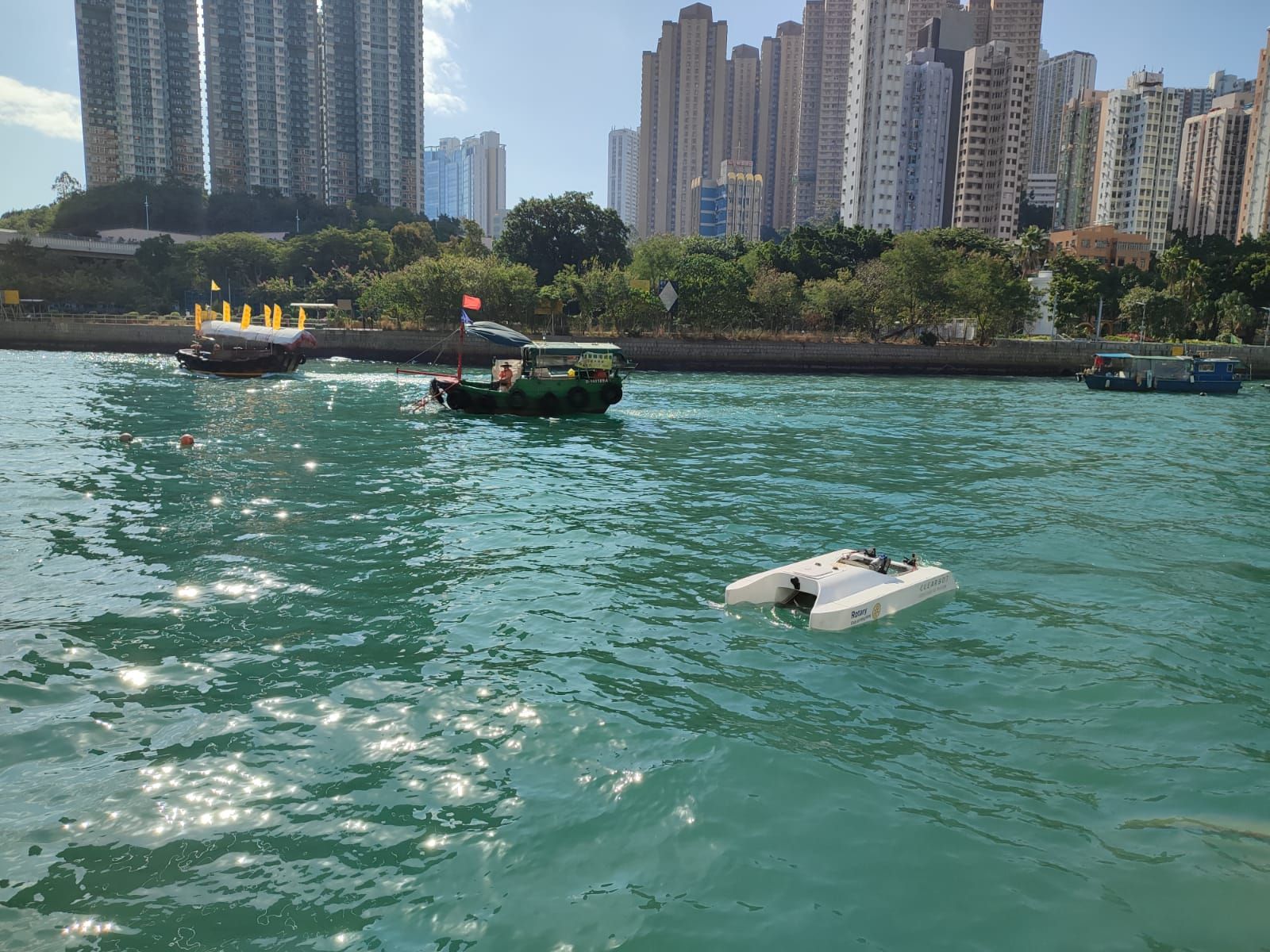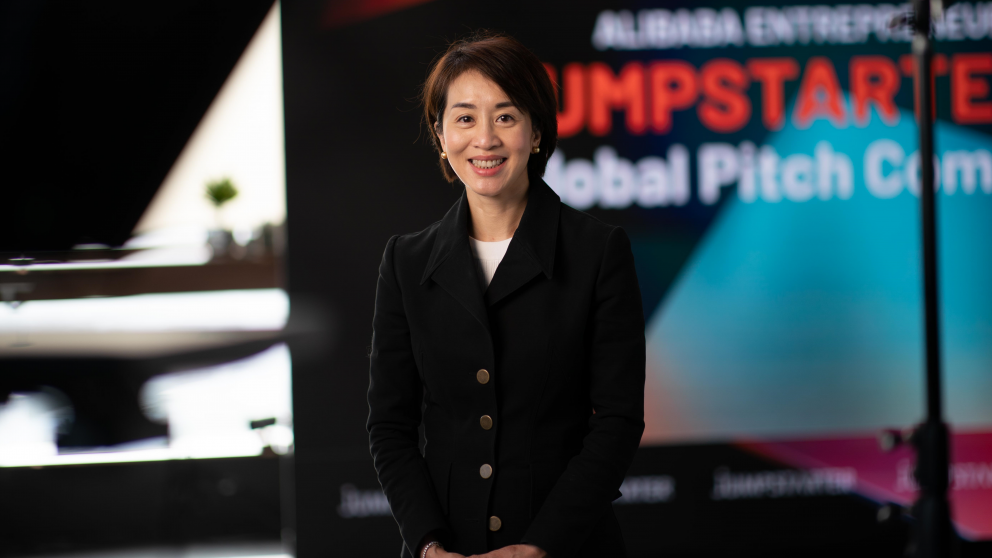
Hong Kong start-up Open Ocean Engineering has created a bot to clear trash out of harbour. Photo credit: Open Ocean Engineering
Hong Kong sits at the crossroads of ideas, people and capital flowing in and out of China, sparking innovation and creativity throughout the city.
Hong Kong was home to 3,755 start-ups in 2021, up 68% from 2017, according to government-backed StartmeupHK.
The growth of this entrepreneurial ecosystem benefits the entire economy by encouraging innovation and keeping business leaders on their toes through partnerships and competition.
“Traditional industries and multinationals need disruptive ideas to stay competitive and efficient,” said Cindy Chow, an Executive Director at Alibaba Hong Kong Entrepreneurs Fund (AEF) told Alizila.
Innovative start-ups have the potential to reshape industries and transform society, but they can only flourish with the funding and expertise needed to turn vision into reality.
Gense Technologies, a provider of low-cost portable medical imaging solutions, said it had tapped into the scientific community in Hong Kong for talent and ideas.
“We are fortunate to work with quite a lot of professors in Hong Kong, and that certainly helps with the research we’re doing,” CEO and co-founder Justin Chan said.
Four Hong Kong universities ranked among the top 100 institutions worldwide on the 2022 list compiled by the British-based Times Higher Education.
Securing early-stage capital remains a crucial challenge for many of Hong Kong’s budding entrepreneurs, especially considering investors have been more reluctant to take risks amid mounting threats to global economic growth this year.
“We faced a lot of difficulties when we started our business, I think the very first one was probably just having funding,” said Sidhant Gupta, founder of Hong Kong-based Open Ocean Engineering, which makes electric boats that scoop trash out of the sea.
Capital Opportunities
Venture capital funds raised $54 billion between January and March, an 8.8% decline from the same period last year, according to a report by investment data company Preqin.
Investors’ fretted about asset valuations, competition for assets, and the Russia-Ukraine conflict. In the first three months of the year, just 202 funds raised capital, the lowest number since 2017. Investors are placing their trust and capital in larger and more experienced venture capital managers, said Preqin analysts.
It’s a hard sell to investors for many fledgling companies who have yet to turn a profit.
“We are saving the environment, but they didn’t see the monetary opportunity at all,” said Open Ocean Engineering’s Gupta.
Where the value for society is clear but profitability remains some way off, early-stage investors such as the AEF step in.
Since 2015, the AEF has helped founders grow fledgling businesses while contributing to Hong Kong’s start-up ecosystem.
“It’s a unique fund with a unique mandate: to stimulate innovation, not for profit but the greater benefit of Hong Kong, the wider region, and the future of young people,” said Chow.
The AEF is a venture capital fund 100% owned by Alibaba. As an evergreen fund, its returns stay in the AEF vehicle so they can be reinvested in new start-ups.

Talent On Show
A focus on nurturing start-ups to overcome challenges and achieve steady growth led the AEF to create Jumpstarter, a global pitch competition, in 2017. HSBC has been the title sponsor since 2019.
This annual pitchfest provides entrepreneurs opportunities to demonstrate their business and win funding from the AEF, sponsors, and the VC community.
Hong Kong’s gravitational pull attracts start-ups from around the world. StartmeupHK data shows 66% of entrepreneurs surveyed were Hong Kong locals and 7% were Hong Kong returnees – but 28% were from Mainland China, the U.S., the U.K., France and India, among others.
Jumpstarter 2022 reflects this diversity: it has already received more than six hundred applications from over 60 countries and regions. The winning start-ups are entitled to an investment of up to $4 million, including co-investment from the Alibaba Hong Kong Entrepreneurs Fund, Hong Kong Cyberport Management Company Ltd and Hong Kong Science and Technology Parks Corp. The results will be announced by the end of this month.
Carbon Infinity, one of this year’s top 10 finalists, develops technology to extract CO2 directly from the atmosphere. The company started in the U.K. but has established a base in Hong Kong for future expansion.
“There is some incredible talent in Hong Kong, not just in finance but in engineering,” David Izikowitz, CEO and Founder of Carbon Infinity told Alizila. “It’s a good place to lay the foundations for a company and a great base from which to grow.”
To be sure, challenges remain, even in Hong Kong: high property rental prices and ongoing demand for talent are likely to continue.
Start-ups tend to happen when innovators have a mission to solve a problem
Problem solvers
Alibaba’s commitment goes beyond providing capital – the company remains involved in helping start-ups after funding.
“We are different from traditional venture capital funds. We spend a lot of time with start-ups post-investment, connecting them with different businesses within the Alibaba Group – and sometimes they provide something complementary to our model,” said Chow.
“It’s a fantastic opportunity to get exposure within the Alibaba ecosystem,” said Izikowitz at Carbon Infinity.
Alongside good ideas and growth potential, AEF looks for start-ups with a strong team with a positive attitude toward overcoming early challenges.
“The key is the team’s passion and dedication – people who can work together with conviction in their product to solve a problem,” said Chow.
Chow adds, “During due diligence, we talk to the people and meet them informally a few times to better understand the culture and how they see the company growing in the future. We like people with ambition for their business that goes beyond seeking a profitable exit – their company must make an impact.”
This approach has helped the AEF develop a strong investment track record, with five unicorns – companies valued at over $1 billion – already on its books.
The AEF portfolio is diverse, comprising roughly 60 companies in their start-up phase. It also invests across sectors, but companies need to be based in the Guangdong–Hong Kong–Macau Greater Bay Area, or have most of their operations in the city, to be eligible for investment.
The philosophy behind the AEF draws on Alibaba’s mission to make it easy to do business everywhere.
“Start-ups tend to happen when innovators have a mission to solve a problem,” explained Chow. “On day one, it’s a single problem, but you will find new problems to solve in new ways as you grow – so challenges help start-ups grow.”
Additional reporting by Terren Ho




